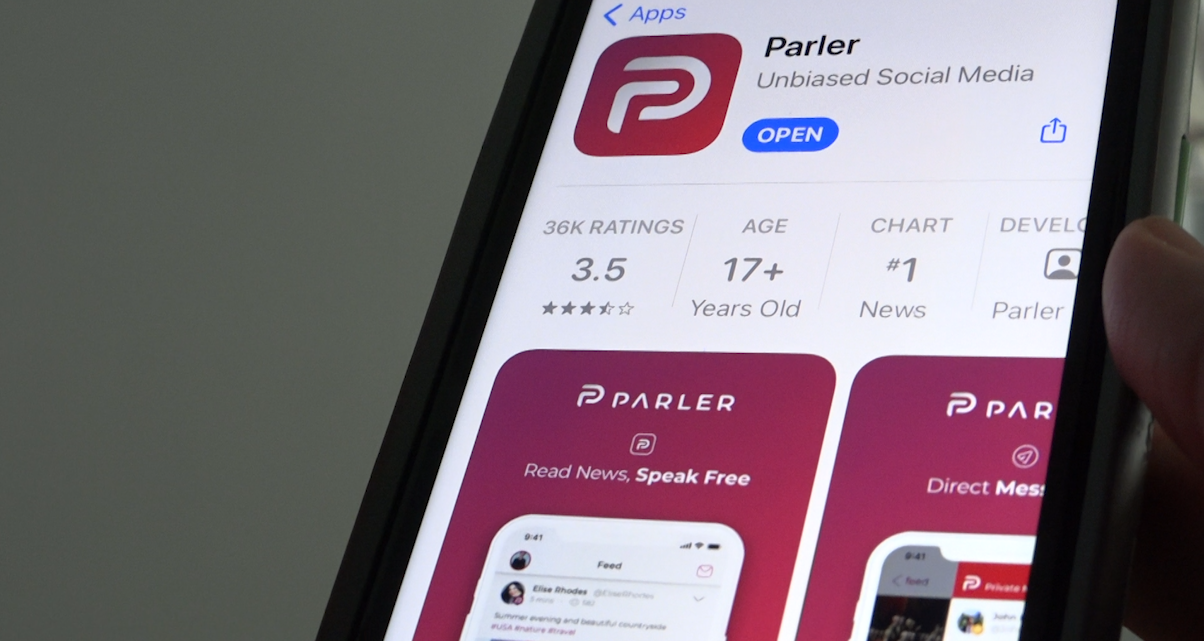ALLENTOWN, Pa. (WLVT) — It’s been nicknamed “Twitter for conservatives.”
In the wake of President Trump's defeat, Parler has become the most downloaded app in the nation. The service touts itself as “the free speech app," and hundreds of thousands of people have joined the site since Election Day.
"There have been calls by certain right-wing personalities for their followers and their audiences to move off of Facebook and Twitter and onto things like Parler because there are no restrictions, no rules. Parler is home to a lot of sort of fringy personalities," explained Matt Krayton, who runs his own digital marketing agency and teaches social media strategy at Centenary University.
With crackdowns by Twitter and Facebook to curb disinformation on its platforms, conservatives have flocked to apps that promise less moderation, like Parler, Liker, MeWe and Gab.
Bret Schafer, who covers disinformation topics at the Alliance for Securing Democracy, a nonpartisan Washington think tank, says platforms that promise less moderation can be problematic.
"In theory, it sounds great to have a space that is less moderated. But these new platforms often become playgrounds for neo-Nazis, racists and homophobes," warned Schafer. "When you say anything goes, believe me, anything goes. Twitter and Facebook did not want to be in the position that they’re in — where they’re having to label tweets from the president. They were forced into it by a host of different problems like hate speech, but also, globally, there were genocides spurred from these platforms."
Parler does not fact-check posts. It does, however, ban pornography, threats of violence and support for terrorism.
Allentown resident and registered Parler user José Gomez agrees that some moderation is necessary. But he says Facebook unfairly censored his views. He was recently banned from the platform for 30 days after a post he made in response to an MSNBC article. He did not disclose the content of the post to PBS39, but said this:
"I didn’t use any profanity. I was respectful in my opinion. I don’t feel that it’s their job to monitor content," said Gomez. "I think, don’t try to sell yourself as this marketplace of ideas, when you’re not willing to welcome any counter facts or counter arguments."
It’s one reason why he’s giving Parler a shot, and he hopes liberals do, too.
"As a conservative, I don’t want social media that’s a right-wing echo chamber. I actually really enjoy engaging with people who are left-wing. I think it’s good to have a free exchange of ideas," said Gomez.
Schafer agrees that platforms that act as an echo-chamber are not ideal.
"I think the more that we create an information space where conservatives exist on one platform, centrists on another, and liberals on another, it equates to us breaking apart into our own information environments," said Schafer. "It’s bad for civic discourse, and it’s bad for democracy."
Krayton is not convinced that so-called conservative social media platforms will last in the long run.
"If you’re talking to people who believe the same things that you do, you’re preaching to the choir. So you need to bring in new people," he said. "The question is, can these platforms achieve that critical mass? I don’t think we’re going to see mass exits of users from Twitter and Facebook anytime soon."
Watch the video version of this PBS39 story in the player below.




